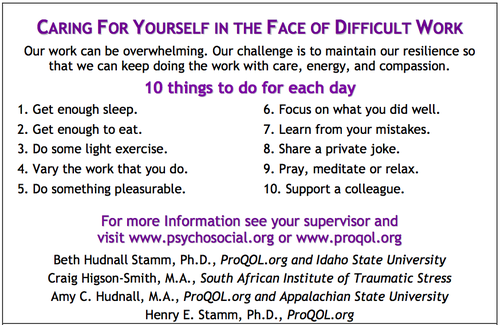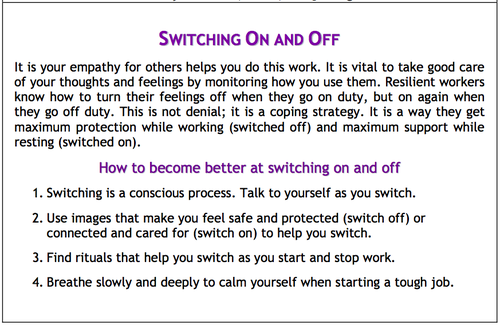



Plan for Resiliency - Self-Care Tips for Helpers
Your results from the ProQoL test can help you to know where to focus your energies. Work with your colleagues to maximizes the positive effects of helping and to minimize and share the negative aspects of the work we do.
See the related topic below - preventing the negative effects of caregiving - it provides more detailed suggestions and strategies for preventing the negative effects of caregiving.


Transforming Compassion Fatigue into Compassion Satisfaction
Top 12 Self-Care Tips for Helpers[4]
Take Stock - What’s on your plate?
Start a Self-Care Idea Collection
Find time for yourself every day – Rebalance your workload
Delegate - Learn to ask for help at home and at work
Have a transition from work to home
Learn to say no (or yes) more often
Assess your Trauma Inputs
Learn more about Compassion Fatigue and Vicarious Trauma
Consider Joining a Supervision/Peer Support Group
Attend Workshops/Professional Training Regularly
Consider working part time (at this type of job)
Exercise
Yoga, meditation, relaxation, mindfulness are all effective strategies to decrease stress and off strategies to protect against compassion fatigue and burnout.
Unrecognized and untreated compassion fatigue causes people to leave their profession, fall into the throws of addictions or in extreme cases become self-destructive or suicidal. It is important that we all understand this phenomenon for our own well-being, but also for our colleagues. If you notice a colleague in distress- reach out to them.
Help is Available - Resources
OMA Physician Health Program (OMA PHP) "The Physician Health Program and Professionals Health Program provides a range of direct services to support health, well-being and resilience of Ontario physicians, veterinarians and pharmacists. We work with individuals, families and workplaces experiencing difficulties with substance abuse and addiction, psychiatric and mental health concerns, stress, burnout, work-related conflict and a variety of family issues.". The service is confidential, independent of Regulatory Colleges and calls can be made without personal identification. Through the programme you can be directed to resources, programmes and providers for yourself or someone you are concerned about.
CMA ePhysicianHealth.com (link) is "the world’s first comprehensive online physician health and wellness resource."
"The CMA Centre for Physician Health and Well-being (link) is a centre of excellence providing leadership, education and research to keep Canadian physicians healthy." Physician Health Matters: a mental health strategy for physicians in Canada, published in February 2010 is available as a PDF from this site.
_________________________________
3. Content in this section from the ProQoL website: www.proqol.org www.proqol.org/uploads/proqol_org_helper_pocket_card.pdf
4. From The website compassionfatigue.ca, Françoise Mathieu. compassionfatigue.ca/wp-content/uploads/2010/10/Top_12_self_care_tips.pdf
 Previous
Previous